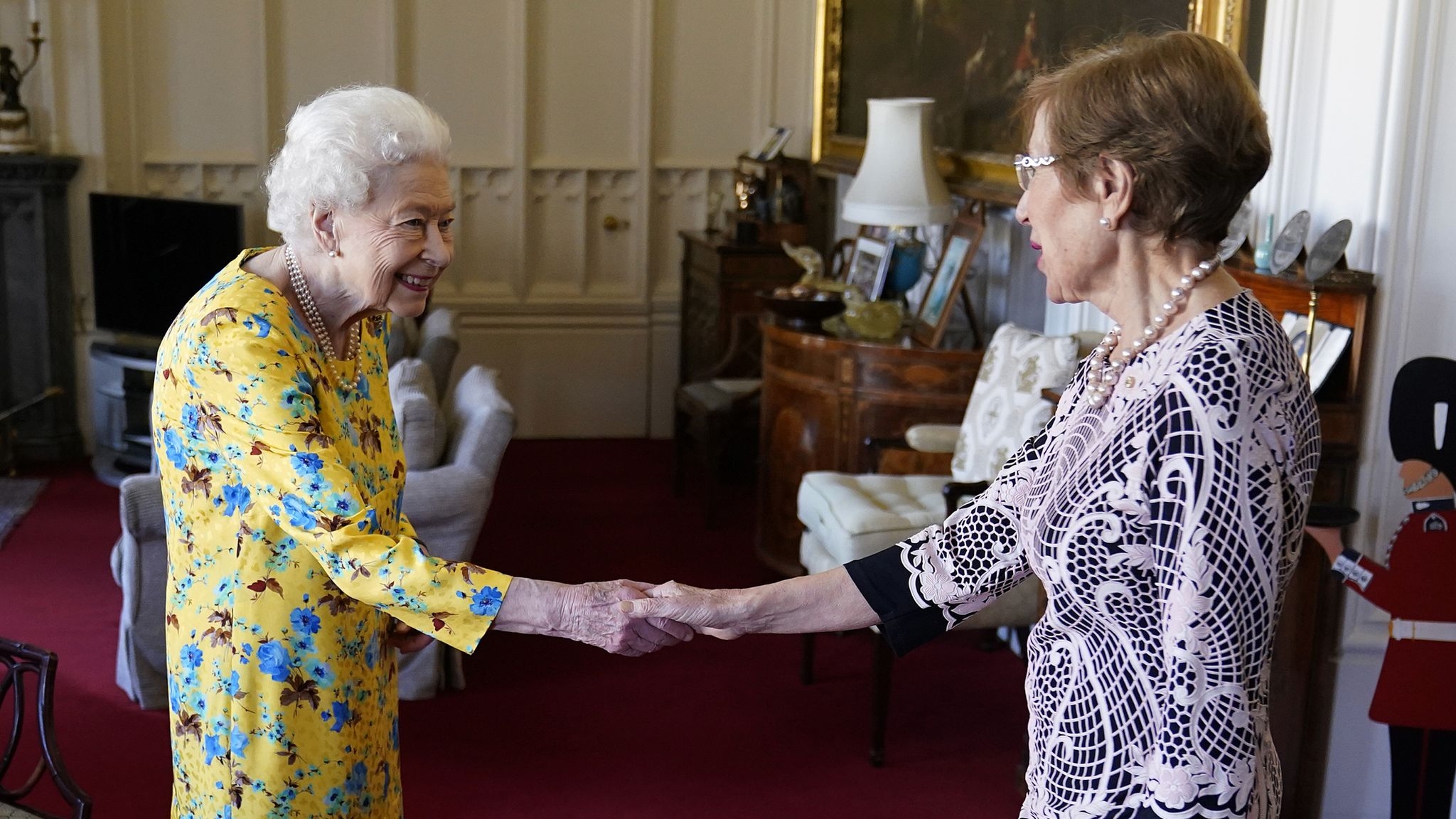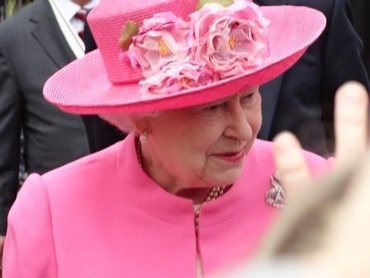Just after 6.30pm Buckingham Palace announced:
The Queen died peacefully at Balmoral this afternoon.
The King and the Queen Consort will remain at Balmoral this evening and will return to London tomorrow.
That is how swiftly the transition happens: The Queen is dead; long live the King. So the man and woman who arrived at a Scottish castle as Prince of Wales and Duchess of Cornwall will depart just hours later as "the King and the Queen Consort".
Just forty-eight hours ago, the Queen was pictured with her newest prime minister, having invited her to form "a government in my name". At the top of yesterday's show, I suggested that the postponement of the Privy Council at which her new ministers would have been sworn in was a serious and disturbing development. As it turned out, Her Majesty did not live long enough to swear in those privy counselors, and the government will now be conducted in somebody else's name.
Here is The Queen just a few weeks ago, earlier this summer:

The lady she is receiving is Margaret Beazley, Governor of New South Wales and thus the Queen's vicereine in Sydney. I mean no disrespect to Her Australian Excellency, when I say that, were I to live till ninety-six, I'm not sure I'd wish to be spending my days discoursing on the ins and outs of public affairs in New South Wales on which subject I'd be expected to be up to speed in all its various nuances.
But that's the job: It's not "glamorous" like Meghan being photographed with Oprah, but it's what the Queen did, right until the end. Yesterday, she sent a message to her Canadian subjects following a mass murder in Saskatchewan, a part of Her Majesty's Dominions I doubt the Duchess of Sussex could pronounce or find on a map. But the Queen did it, day in, day out until, well after sundown, the last "red box" was read. She did it for seven decades through her twenties, thirties, fifties, eighties, and into her mid-nineties. She was a public figure – a "working Royal", in that somewhat crass phrase – for even longer, for the best part of ninety years. Three-quarters of a century ago, upon the occasion of her twenty-first birthday in 1947, Princess Elizabeth addressed "all the peoples of the British Commonwealth and Empire, wherever they live" from Cape Town:
There is a motto which has been borne by many of my ancestors - a noble motto, 'I serve'. Those words were an inspiration to many bygone heirs to the Throne when they made their knightly dedication as they came to manhood. I cannot do quite as they did.
But through the inventions of science I can do what was not possible for any of them. I can make my solemn act of dedication with a whole Empire listening. I should like to make that dedication now. It is very simple.
I declare before you all that my whole life whether it be long or short shall be devoted to your service and the service of our great imperial family to which we all belong.
As princess and queen, Elizabeth II kept that promise to "our great imperial family" through turbulent times that have wholly transformed the world. Her Majesty was the longest-reigning monarch in British history, the world's second longest-reigning monarch (after the French king, Louis XIV), and the first real Head of the Commonwealth – a faintly absurd novelty that the Queen singlehandedly built into something real and consequential. She slogged on as her body wore out, and always rejected any notion that, like the Dutch and Spanish monarchs, she should take early retirement and enjoy her last years with the dogs and horses whose company she, entirely reasonably, preferred to most of her ministers.
Not a lot survives from 1952. Harry Truman was in the White House, Joe Stalin was in the Kremlin, Chairman Mao had just taken over in China. The British Empire was still a phrase taken seriously: it was not yet a joke, a punchline, and then a hate crime. Truman, Stalin, Mao are all long gone, but, until today, the Queen endured. Most of her cousins in the other European monarchies did not. She was a survivor, and they weren't. Ours is not an age of kings, and those born to royalty have to be pretty nimble. In the end, said the late King Farouk, there will be just five kings, the four in a pack of cards and the King of England - or the Queen.
She first appeared on a banknote when she was an eight-year-old princess on the Canadian $20 bill of 1935. Eighty-seven years later, she's still on the Canadian $20 bill. And in between those two notes, she graced more stamps, more coins, and more banknotes of more countries than anybody in the history of the planet.
The picture of the Queen above is by my darling daughter, taken in Scotland a couple of years back and one I like very much. I was fortunate enough to meet Her Majesty a couple of times over the years, and I treasure those memories, not because I drool over celebs but because I take constitutional monarchy seriously as a system of government:
Is the monarchy anything to do with the unrivaled record of the Britannic inheritance? Working for the Free French in London during the war, Simone Weil found herself pondering why, among the European powers, only England had maintained 'a centuries-old tradition of liberty'. She was struck by the paradox of the Westminster system — that ultimate power is vested in one who cannot wield it in any practical sense.
Except that, by the mere fact of her existence, she diminishes the politicians.
On Friday I will be on The Megyn Kelly Show live across America at 12 noon Eastern/9am Pacific, and will have more to say, with deep regret that this day has finally come to pass. The Queen is the only monarch the vast majority of her subjects around the Commonwealth have ever known. As one of them myself, I have never had any desire to live under any other sovereign, and, as many readers and viewers and listeners will know from my frequent references to Joseph Roth's great crepuscular novel of the Habsburg twilight Radetzky March, I view the future with great foreboding.
A decade ago, writing in the Australian Spectator on Her Majesty's Diamond Jubilee, I concluded:
Despite all the chipping away, something endures, and so our octogenarian sovereign carries on, waving a white-gloved hand at young befuddled subjects who've never known any other monarch and couldn't reliably explain the point of her.
As Joseph Roth wrote of the aged emperor, 'He allowed people their errors, and he believed less in the permanence of the world than did the wags who told jokes about him in his vast empire.'
One day we will miss the Queen, and mourn the impermanence of the virtues she embodied. Vivat Regina.
"Vivat Regina" no more. God save the King.






















